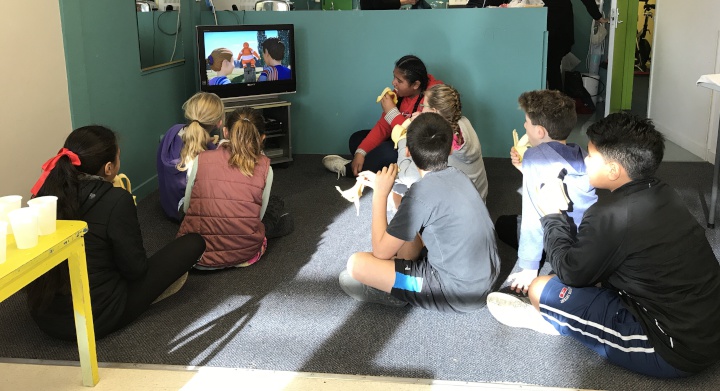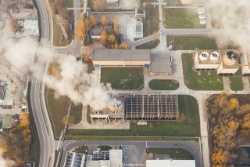Diverse entries recognised in Irrigation Innovation Awards
Monday 26 February 2018
Diverse entries recognised
in Irrigation Innovation Awards

A water race safety video for children, a GIS Database system helping farmers to meet environmental requirements and a new effluent screen which allows effluent to be more easily applied via centre pivot irrigators have been named as finalists in IrrigationNZ’s Irrigation Innovation Awards for 2018.
Be Water-Race Safe is a video for school age children developed by the Waitaki Irrigators Collective. Some of the Collective’s member schemes operate open water races in parts of Waitaki and Waimate, which supply water for irrigation, stock, town supply, and industry.
“Irrigation races can seem inviting to children to swim in and we wanted to educate children on the potential dangers while they are at primary school before they reach an age when they might be more inclined to carry out risky behaviour,” says Elizabeth Soal of the Waitaki Irrigators Collective.
The animated video has been shown to 2,000 children from 21 schools in North Otago and South Canterbury. The Collective also engaged a water safety expert to talk to 400 local schoolchildren about what to do if they find themselves in trouble in water. The advice, along with the water-race safety video, was delivered to children at the Waitaki Clued-Up Kids programme, an annual two day event where children receive safety messages on a range of topics like fire and gun safety and civil defence. Waitaki has a significant number of lakes and rivers used for recreation, so the advice could be applied in a range of situations. Children tested before and after watching the water-safety video showed improved awareness of the dangers of water-races.
Aqualinc were also finalists in the Innovation Awards for their GeoRural GIS Database System. The system is widely used by farmers and irrigation schemes for developing and managing farm environment plans and for a range of other purposes. The cloud based system uses a range of GIS functions. It incorporates comprehensive elevation survey data, climate, hydrology, soil and consent data and aerial photos. It has less dependency on internet speed than most geo-based software and allows for intermittent internet access.
Regional Councils in Canterbury, Hawkes Bay, Manuwatu-Wanganui and Otago now require farm environment plans to be developed for some types of land use. The plans cover how farms will manage and reduce their environmental impacts including issues like fencing off waterways, protecting native vegetation, reducing nutrient discharge and managing effluent.
“The system has a lot of data which makes the process of developing a farm environment plan much easier for farmers. GIS is a great way to visualise and share data. The system ensures that information is retained in one location which will be available long-term to farmers,” says Ayaka Kashima of Aqualinc.
To date, the majority of farm environment plans developed in Canterbury have used the GeoRural system. The system is also being used to help manage nutrient loads in the Hurunui Catchment, and has support from major stakeholders.
Rainer Irrigation’s Vibra Screen is the third finalist in the awards. The screen removes solids larger than 1mm which allows solids and liquid to be separated in effluent, with the liquid able to recycled in centre pivot irrigators to fertilise pasture.
Effluent is often used as a replacement for fertiliser, but is most often applied through small travelling irrigators. Applying effluent through centre pivot irrigators allows for a larger area to be covered and for more consistent application. Technology does exist currently allowing for effluent to be applied through centre pivot irrigators but it can be problematic, with blockages often creating issues.
Mid Canterbury dairy farmer Peter Holmes is one farmer who has used the new system on his property which has 1,550 cows and two dairy sheds. “The system works pretty well. Being able to spread effluent through the pivots means it can be spread over a larger area and it’s a lot less staff time and hassle than the travelling irrigator system we used to use. Once its applied we get good grass growth,” he says.
14 applications were received for the awards. The award winner will be announced at IrrigationNZ’s 2018 Conference held in Alexandra in April. The award is sponsored by Southern Wide Real Estate and has a prize of $2,500.
ends


 Brewers Association: Brewers Association Of New Zealand Supports Modernisation Of Alcohol Legislation
Brewers Association: Brewers Association Of New Zealand Supports Modernisation Of Alcohol Legislation Commerce Commission: ComCom Warns Of Pyramid Schemes After South Auckland Scammers Plead Guilty
Commerce Commission: ComCom Warns Of Pyramid Schemes After South Auckland Scammers Plead Guilty MBIE: MBIE Publish Mid-Point Review Of The Phase-Out Of The Low Fixed Charge (LFC)
MBIE: MBIE Publish Mid-Point Review Of The Phase-Out Of The Low Fixed Charge (LFC) Science Media Centre: Company Claims To Have “De-Extincted” The Dire Wolf – Expert Reaction
Science Media Centre: Company Claims To Have “De-Extincted” The Dire Wolf – Expert Reaction Stats NZ: Greenhouse Gas Emissions Fall 2.0 Percent In The December 2024 Quarter
Stats NZ: Greenhouse Gas Emissions Fall 2.0 Percent In The December 2024 Quarter The Reserve Bank of New Zealand: Christian Hawkesby Appointed As Governor Of The RBNZ
The Reserve Bank of New Zealand: Christian Hawkesby Appointed As Governor Of The RBNZ



